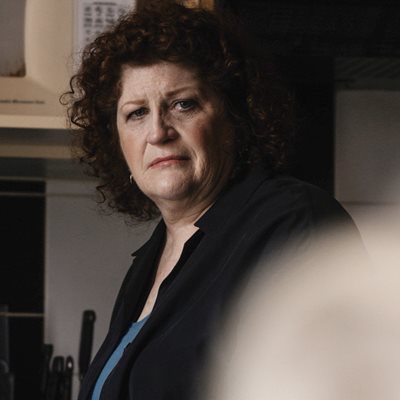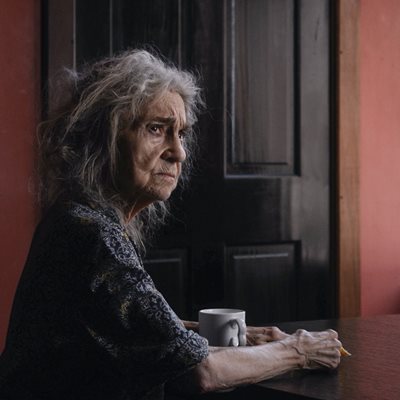
Double Your Impact for the Holidays
Double Your Impact for the Holidays
Your urgently needed year-end gift can go twice as far to provide care and support and accelerate Alzheimer's research this holiday season — and all year long. Show your giving spirit today during this 2x Match Challenge.
Donate Now“Ruth” is a 9-minute short film starring the late Lynn Cohen as the mother, living with Alzheimer’s, with Barbara Tirrell playing her daughter and caregiver. Actor David Hyde Pierce, a longtime Alzheimer's Association Champion and caregiver said of the film: “Beautiful in every detail, this is an emotional story told without sentimentality.” We spoke with director Alex Berg about why this project was so special.
Tell us about creating the short film “Ruth.”
The true inspiration comes from observing my grandfather, Ralph, who started to experience symptoms of dementia in 2007. These began mainly as memory issues, soon after losing his hearing. He would recall ‘his days at Fort Lewis’, or ‘cattle round-ups in Montana’ — none of which he did. He also had hallucinations, seeing horses near his pond that weren’t there. My grandfather ultimately never forgot who I was, which I am thankful for. He died in 2011, at age 92.
When I would sit with my grandfather, he would ask for an Oreo cookie every five or six seconds. For the family in the room, depending on their mood, this was either funny, sad, endearing, annoying, irritating, or any number shades in between. These reactions to Alzheimer’s and dementia behaviors are only heightened and dramatized under certain family circumstances, and I wanted to show how that really looks in the film, particularly through the mother character’s love of chocolate.
 Caregivers don’t always have a full human dimension in a story, and I wanted the daughter-caregiver in the film to be just as central as the mother character, going through personal challenges of her own, ones that don’t go away just because she is a caregiver. The mother-daughter relationship in a precarious stage of life is really interesting, considering the many special challenges we know all caregivers have to contend with.
Caregivers don’t always have a full human dimension in a story, and I wanted the daughter-caregiver in the film to be just as central as the mother character, going through personal challenges of her own, ones that don’t go away just because she is a caregiver. The mother-daughter relationship in a precarious stage of life is really interesting, considering the many special challenges we know all caregivers have to contend with.
What did you learn about caregiving when your grandfather was battling dementia?
I was around my grandfather often and observed the effects caregiving had on my parents, aunt and uncle. I also saw other caregivers going through similar situations.
I have seen the toll it has taken, but also the joys and unique experiences caregivers I know have been through. I saw the last 5-10 years of my grandfather’s life play out, losing more and more of himself. I will never forget it, and it's those rare moments of clarity that he had that stuck with me the most.
Mostly, I realized the connection that never fully fades, which I hope the end of “Ruth” indicates: that love is never really lost, even when Alzheimer’s or dementia is at play.
Talk more about the mother-daughter relationship in the film and the two leads.
In “Ruth”, the daughter is facing a precarious situation at work and the potential of losing control of a large client. As she sends text messages back and forth with her employer, her mom is displaying Alzheimer’s behaviors across the room. I was very interested in the juxtaposition between the workplace stressors and the struggles her mother finds herself facing during a difficult moment.
 After a friend recommended some actors for our two female leads, we chose Lynn and Barbara. It turned out that they had worked together as mother and daughter 30 years prior in “The Seagull” in Minneapolis, the same city where I went to high school. I got chills! This was meant to be, bringing these women back together in similar roles they once played, giving our project even more poignancy. Both Lynn and Barbara were incredible actors during the one-day film shoot, Lynn always cracking jokes. I am lucky to have had her friendship and to still have the friendship of Barbara today.
After a friend recommended some actors for our two female leads, we chose Lynn and Barbara. It turned out that they had worked together as mother and daughter 30 years prior in “The Seagull” in Minneapolis, the same city where I went to high school. I got chills! This was meant to be, bringing these women back together in similar roles they once played, giving our project even more poignancy. Both Lynn and Barbara were incredible actors during the one-day film shoot, Lynn always cracking jokes. I am lucky to have had her friendship and to still have the friendship of Barbara today.
What do you most hope people will take away from the film?
The biggest joy of releasing this film has been caregivers who have seen, commented and connected with it. People have responded strongly and enthusiastically to the film through personal messages and Facebook caregivers groups. I hope I did them right by depicting an authentic caregiver experience. I want caregivers to feel seen and appreciated, and to shine a light on their underappreciated efforts and the unique challenges all caregivers face.
I also want people to walk away feeling uplifted about the connections we have in our lives that never go away. The making of the film was such a delight: bringing people together to create a shared vision, actors and crew, walking away fulfilled, and hoping we made a difference. If someone views “Ruth” and is positively affected by our film, I want them to share their feelings, and share the film with others who are going through a caregiving experience. It is only by sharing that we all learn from one another.
 “Ruth” is available on YouTube, courtesy of Omeleto. Alex Berg’s newest short film, “Hold Up,” recently won several festival awards in London. Learn more about Alex, who began his film career annotating the script for the Academy Award-winning film “Capote.”
“Ruth” is available on YouTube, courtesy of Omeleto. Alex Berg’s newest short film, “Hold Up,” recently won several festival awards in London. Learn more about Alex, who began his film career annotating the script for the Academy Award-winning film “Capote.”
Photo credits: Film stills by Taylor Antisdel; Headshot courtesy of the Florida Film Festival
Related Articles
Caregiving

The first survivor of Alzheimer's is out there, but we won't get there without you.
Donate Now
Learn how Alzheimer’s disease affects the brain.
Take the Brain Tour
